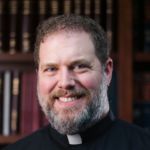
Is Jesus telling us that we should all act like little children or old women? Maybe so. Just as, through the inspiration of Scripture, the old and infirm might find themselves spiritually strong and youthful, so, in the parable of the persistent widow, those who are young and strong should call to mind that their strength is nothing without prayer. We might be tempted to think, when possessed with vigor and resources to accomplish the things that we want in this life, that we do not need to rely on the grace of God. But before the great judgment seat we are all paupers, we are all weak with little to offer.
The judge in the story is, in the Lord’s own words, not a good man; he is not therefore some easy analogy to God, but rather analogous by contrast. But one similarity is that the judge in the story isn’t swayed by might or force or bribe; he doesn’t need anything that the widow can give him. The evil judge gives the widow what she wants out of annoyance, not out of necessity. God gives us what we ask not out of necessity, but out of his good pleasure. Like the widow, we do not stand before him in a position of power, and he does not sit before us as one in need. But, as the story goes, if even an evil judge can do something good on a whim, how much more can God do something good based on his loving kindness?
The Gospel stories consistently remind us of the unrealized power of prayer. Our story from Exodus, where Moses helps the Israelites defeat Amalek simply by holding aloft his hands in prayer—a gesture clearly foreshadowing, at least in the mind of the early Church, the arms of Christ on the cross. Christ is the new Moses, after all. We are like Israel: having escaped from slavery to sin and death, we have crossed the Red Sea in the waters of baptism and begun a long journey to home beset with many dangers. But in the parable of the widow, the Lord reminds us that we too have this priestly ministry of intercession.
Does God need our prayers? Or, more pointedly, does prayer change God’s mind? No, and no. How then can we affirm the crucial importance of prayer? No one puts it better than St. Thomas Aquinas (ST II-II. q 83 a. 2):
In order to throw light on this question we must consider that divine providence disposes not only what effects shall take place, but also from what causes and in what order these effects shall proceed.
Now among other causes human acts are the causes of certain effects. Wherefore it must be that men do certain actions, not that thereby they may change the divine disposition, but that by those actions they may achieve certain effects according to the order of the divine disposition: and the same is to be said of natural causes.
And so is it with regard to prayer. For we pray not that we may change the divine disposition, but that we may impetrate that which God has disposed to be fulfilled by our prayers in other words “that by asking, men may deserve to receive what Almighty God from eternity has disposed to give,” as Gregory says.
Peter Kreeft describes it like this: “God instituted prayer for the same reason he instituted work: to give us the dignity of being real causes, active coworkers and cooperators with him.”
Prayer works because of human freedom, in other words; prayer works because God wants it to work, because he wants us to participate in what he does and not be mere passive observers and recipients. And he wants this because he wants our salvation and perfection; it is not good enough that we be preserved from danger or destruction at the cost of our freedom.
But freedom is hard. Constant prayer is hard, and constant work is hard. We get tired. Moses’ drooping arms before the Amalekite army is such a powerful reminder that we are not called to carry these burdens alone, even the burden of playing some minor part in the greater works of God.
The more time goes on, the more I recognize this reality in myself as someone charged with holding up his hands for the Church as a vocation. So it is amazing and wonderful that the Lord has provided for me people like the women of the Seven Sisters apostolate and the men of the Fasting Brothers who support my weary arms in ways that I will probably never fully appreciate in this life. I am grateful for the lay leaders on parish councils who share the burden of governance and decision-making. And that’s just the tip of the iceberg.
But let’s be clear that this image of Moses isn’t just about pastors and priests; all the baptized are configured to Christ’s ministry of intercession for the Church and the world. All of us are called to participate in this work, and it is a work of long patience and persistence. All of us need help in bearing these burdens for ourselves, our families, our parish, our world. If there is one thing that I tell people in the confessional more than anything else, it is that we do need to bear all our burdens alone—whether it’s just the ordinary stress of family life or marriage, addiction or disordered habits, or problems of mental or physical health. The devil wants us to think we are alone. We are not. It is not brave to avoid asking for help. It is foolish.
So go to confession, go to Communion, go pray, and ask for the grace of God, with persistence and boldness. But don’t forget to ask for the grace of your brethren when you grow weary, for only Christ himself is able to hold the weight of the world in his arms.



